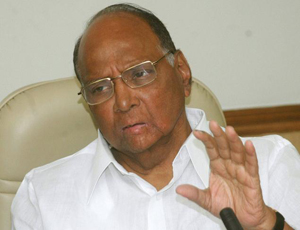New Delhi, Dec 11: 'Self-styled' loyalists of 10, Janpath convinced Sonia Gandhi that it would be better to back P V Narasimsha Rao in 1991 as Prime Minister over him as the "Gandhi family was not about to let someone with independent mind" to get the top post, Sharad Pawar has claimed.
 The loyalists including the late Arjun Singh, himself an aspirant for the prime minister's post played a "clever trick" to convince Sonia Gandhi in the decision to choose Rao over Pawar, says the NCP President, who became Defence Minister in Rao's cabinet.
The loyalists including the late Arjun Singh, himself an aspirant for the prime minister's post played a "clever trick" to convince Sonia Gandhi in the decision to choose Rao over Pawar, says the NCP President, who became Defence Minister in Rao's cabinet.
Pawar has made these claims in his book 'Life on my terms-From the Grassroots and Corridors of Power', which was formally released in the presence of a galaxy of political leaders including Gandhi, Prime Minister Narendra Modi and the President and Vice President at a function to celebrate his 75th birth day, which is tomorrow.
He says that his name was considered for the top post in the party not only in Maharashtra but also in other states. He was personally more circumspect as he was aware that a lot depended on the inclination of 10 Janpath, where Sonia Gandhi resides.
"Though a senior leader, P V Narasimha Rao had withdrawn from mainstream politics for health reasons before the election. Given his long experience, there were suggestions to bring him back following the unforeseen exit of Rajiv," Pawar states in his book.
"Self styled loyalists of 10 Janpath started saying in private conversations that Sharad Pawar's election as prime minister would harm the First Family's interest in view of his young age.
"'Woh Lambi Race Ka Ghoda Hoga' (He will hold the reins for a very long time), they argued. Among them who played a clever trick were M L Fotedar, R K Dhawan, Arjun Singh and V George.
"They convinced Sonia Gandhi that it would be safer for her to back Narasimha Rao because he was old and not in a good shape. Arjun Singh himself aspired to become prime minister and hoped to succeed Rao soon. Anyway, once Sonia Gandhi had bought the coterie's 'bring Rao' argument in 1991, the tide turned against me," Pawar says.
Rao was ultimately chosen over Pawar who had secured a lead of over 35 votes. Later P C Alexander, a former principal secretary to Indira Gandhi and close confidant of the family,BROKERED a meeting between him and Rao with an offer of top three portfolios.
"He (Alexander) and I knew that I had been a strong contender but Gandhi family was not to let someone with independent mind to get to the Prime Minister's post," adds Pawar.
In another chapter, the Maratha leader, who was then Leader of the Congress in Lok Sabha, says ahead of voting on no-confidence motion against A B Vajpayee's government in 1997, he had told BSP chief Mayawati that it would be in her party's interest if she voted against the government.
In April, the AIADMK withdrew its support of 18 MPs after the Vajpayee government refused to accept the demands made by its chief J Jayalalitha.
Pawar states that the motion of no-confidence motion was put to voice vote and the Speaker declared it passed but the opposition demanded on division of votes.
"After the speaker announced division of votes, the Parliament staff took sometime to close the doors and activate the voting machinery. During those few minutes I took the BSP chief Mayawati aside and had a word with her. The BSP had five MPs and there was an intense speculation on what stand it would take.
"When the electronic machine displayed that the Vajpayee government had lost by just one vote, everyone got into a guessing game on who voted on which side. Those who had noticed me talking to Mayawati before the voting pressed me to clarify. However, I thought it prudent to keep mum. Even after so many years I am asked about what transpired between Mayawati and me.
"Well let me put this way. I just impressed upon her that BSP's interest in Uttar Pradesh would be best served if she voted against the Vajpayee government. Amen!" says Pawar.
At the last minute, the BSP had decided to vote against the government in the motion.





Comments
Add new comment